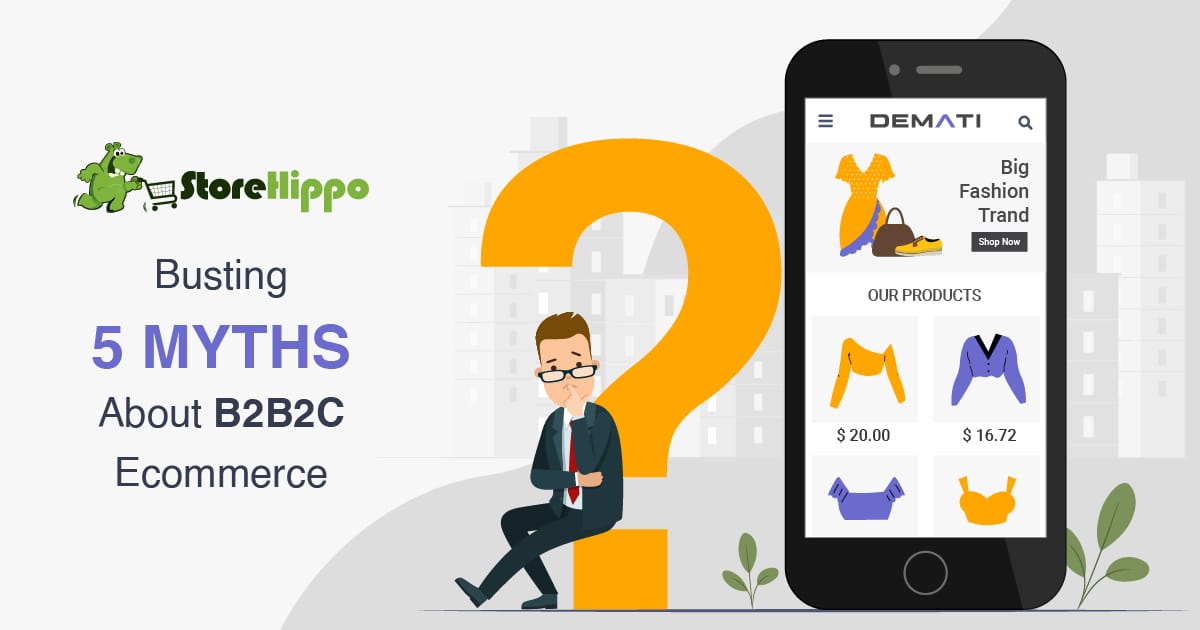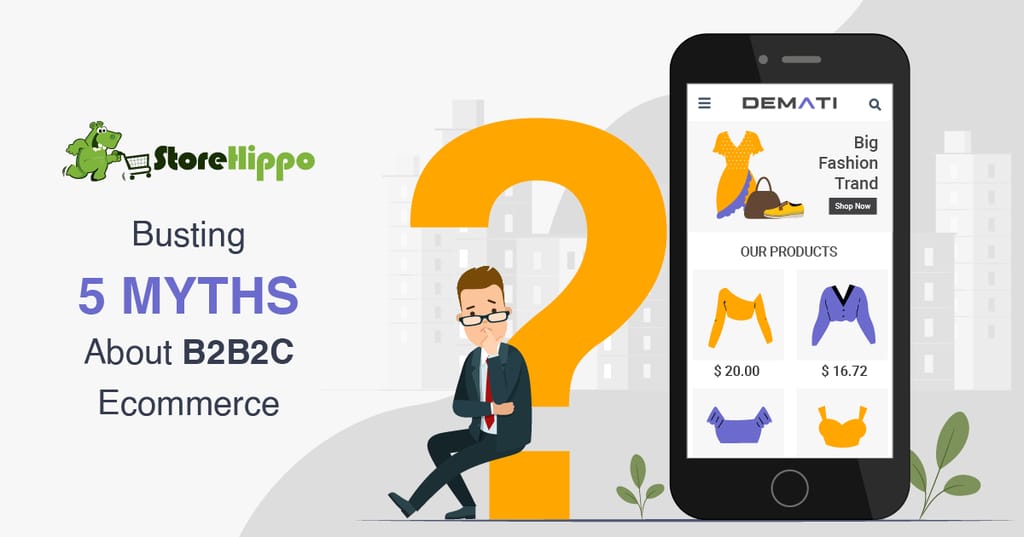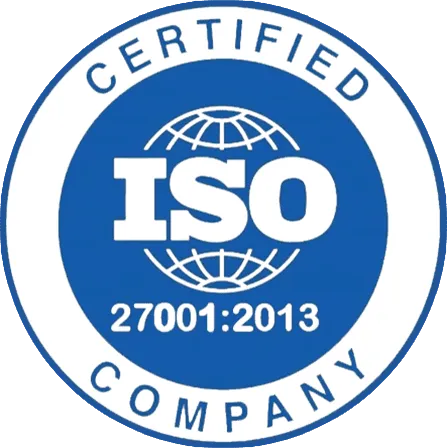B2B2C ecommerce is a lucrative but tricky business model to maneuver!
Thanks to many myths circulating in the business-to-business-to-consumer ecommerce ecosystem, brands are hesitant to leverage the business model despite knowing it can be their ticket to success.
But here we are, debunking all the myths and going down straight on the facts on how to establish a conversion-oriented B2B2C marketplace.
But before we go any further, let us first go around the business model and understand its basics.
Table of Contents
How can we define B2B2C?
Businesses usually fall into one of the three buckets:
- B2C, who sell to the consumers
- B2B, who sell to other businesses
- B2B + B2C, who sell to consumers and businesses parallelly
But how and where does the B2B2C business model adjust?
In simple terms, any business that sells to a business (B2B) that sells to a consumer (B2C) is a B2B2C ecommerce business. The first business is a supplier, offering its products/services to the second business, which then combined with its own offerings, sells it to the end customers.
For example:
- Zomato is a B2B2C service aggregator that connects restaurants and cloud kitchens to the end customers
- Ola is a giant B2B2C marketplace that partners with various cab, auto, and bike owners and drivers who offer their services.
- Urban Company is the largest Indian B2B2C online platform that connects customers with local professionals for a range of services like beauty/wellness, home repair, yoga training, cleaning, pest control, etc.
What makes the B2B2C ecommerce business model widely accepted?
Brands are rushing towards the B2B2C business model for a lot of reasons. Here is a quick glimpse of the business model gaining popularity:
Infographic: B2B2C model gaining popularity
- 25.49% of enterprise brands pivoted successfully to a B2B2C model
- 39.22% of manufacturers are currently making efforts to adopt the B2B2C model
- 42.3% of brands’ second main sales channel was B2B2C
Source: Copperberg
There is no doubt a lot of benefits to adopting the B2B2C business model for all parties involved. Many B2B brands are now shifting their sales channels and partnering with retailers to leverage retailer's distribution channels. A B2B2C ecommerce platform allows brands to reach a broader customer base and boost their conversions.
Here are a few reasons that make the business-to-business-to-consumer model a success for enterprise brands:
- It enables brands to engage directly with the end customers
- Opens up new markets as brands can cater to a wider customer base
- Brands can scale to newer segments and industry verticals
- Helps build stronger brand recognition and consumer trust
- Gives brands access to rich customer data about their preferences and behavior
- Makes growing business easier with access to tech solutions Helps enterprise brand multiply and diversify their revenue streams
- B2B2C ecommerce provides a launchpad to test various product-market mixes
With the blurring lines between the B2B and B2C business models, the B2B2C e commerce offers a new way to use the synergies between both models and attain growth like never before. From new start-ups to traditional companies, all are considering pivoting to the B2B2C business model. The B2B2C model enables brands to better understand and fulfill customer expectations and in turn, get valuable insights for strategic growth.
Debunking 5 Myths about B2B2C Ecommerce
With the B2B2C marketplace being the talk of the ecommerce town, it has surely attracted a few myths. As the business model continues to evolve with time, people tend to believe things that come their way. But don't worry, we are here to guide you through and bust the myths surrounding the versatile ecommerce business model.
Let’s get started:
Myth 1: Complex to implement
A majority of people believe that implementing the B2B2C ecommerce model is complex. Since it combines the two models, B2B and B2C, it would be tough to attend to the combined needs.
Reality
Diversifying to the B2C sector and taking up the B2B2C approach requires a B2B2C ecommerce solution that is scalable and seamlessly helps with enterprise-level business operations. The ease of managing and running the business depends largely on the solution you choose for your enterprise business.
StoreHippo ecommerce platform is designed on the future-ready MACH (Microservices, API-first, Cloud-native, Headless) architecture that helps the brands to build tailor-made ecommerce solutions for diverse business needs. You can also tweak the platform inside out without having to disrupt the entire ecosystem. StoreHippo comes with 300+ in-built features that help take care of diverse business models. With the built-in support for B2B and B2C ecommerce solutions, StoreHippo helps to seamlessly run and grow your B2B2C marketplace. StoreHippo also comes with a comprehensive multi vendor solution that helps businesses manage B2C sellers who eventually cater to end buyers.
Myth 2: B2B2C is just B2B and B2C put together
By creating different sales channels for B2B and B2C buyers you can leverage the benefits of B2B2C ecommerce.
Reality
If you are one among those who think having your B2B and B2C sales channels is equal to having a B2B2C business model, you are certainly mistaken. While B2B2C has elements of both B2B and B2C, the core difference here is that the parent brand as well as the other businesses collaborating with it are eventually serving the same target customer.
This unique aspect of the B2B2C business model means that the core focus is on the B2C audience segment. The B2B part of B2B2C ecommerce is mainly focused on facilitating other businesses in growing their business and using collaboration to offer value-added services to the end buyer so that they remain loyal to the parent brand/platform.
For example, Zomato is a B2B2C service aggregator that partners with multiple restaurants, who then offer their products to the end customers. Here the parent company Zomato is interacting with the customer but through intermediaries (restaurants).
StoreHippo, the best B2B2C ecommerce marketplace builder, is built on a headless architecture that gives brands the creative freedom to build custom and personalized buyer journeys for both B2B and B2C aspects of the business. StoreHippo’s gamut of features and built-in support for both B2B and B2C business models help businesses run the B2B2C setup seamlessly.
Myth 3: B2B2C is limited to certain industries
For those believing that B2B2C ecommerce platform is the best fit for certain industries only, it is time to bust the myth.
Reality
The B2B2C business model is best fitted for any and every industry where the business manufactures or provides products/services through a large distributor network. The business model is all about blending the two frameworks (B2B and B2C) together and forming a new business entity that collaborates with other businesses to sell to the end customers.
Here are 5 such industries that can chart an upward growth trajectory with the B2B2C ecommerce route:
- Beauty and cosmetics brands can connect with retailers and create a B2B portal for retailers while having a B2C online store for the customers
- Fashion brands can create the retailers brand shop on the B2B2C platform that offers the retailers an online presence to attract loyal customer base
- Food and beverage business can also digitize their wholesale channel and create various B2C location-based sub-stores
- Pharmaceutical and healthcare businesses can build B2B online stores to sell in bulk to the hospital chains and also create a B2C channel to widen their buyer base
- Businesses dealing with baby care products can also build a B2B2C ecommerce platform to diversify their sales channels
Many more such industries along with the above-mentioned enterprise businesses can grow their ecommerce presence with the opportunities offered by the business-to-business-to-consumer ecommerce set-up. However, to do so, brands need the best B2B2C ecommerce marketplace builder that offers solutions for multiple industries.
StoreHippo comes with comprehensive solutions and supports any type of hybrid business model. It comes with 300+ built-in enterprise-grade features including comprehensive product management, order management, invoicing, tax engine and more to help businesses offer a seamless buying experience to both their B2B customers and B2C customers.
Myth 4: B2B2C does not require customer-centric strategies
B2BC does not require you to focus on customer-centric strategies, you just need to take care of your partnering B2B businesses.
Reality
When you enter the B2B2C ecommerce domain both your partner businesses and the end buyers are your clients. While you need to facilitate your seller partners to get the most out of your set up, the end customer expectation remains pivotal to the growth of your brand as well as your partners.
It is crucial to strategize your marketing, branding and customer experiences across channels so that your B2B2C brand remains competitive and creates a niche for your business. While facilitating your B2B partners with tech, delivery and branding solutions you also need to offer an engaging UI/UX, seamless navigation, personalized discounts and frictionless checkouts to your buyers.
Long term B2B2C marketplace success is possible only when your customers are happy and keep coming for more to your brand and its intermediary businesses.
It will however need a lot of planning and implementation to create an engaging design, a seamless buyer journey and an ecommerce strategy that aligns well with both the audience groups.
StoreHippo offers a host of in-built marketing tools to help you strategize and execute your marketing plans with a focus on your customers. It offers a separate vendor login for each of the business partners on the B2B2C ecommerce platform. The personal dashboard helps the sellers/business partners to work towards offering the best possible shopping experience to their customers and analyze their orders, reports etc in a quick glance.
With the powerful built-in discount engine, you can run multi-level discounts and coupons as part of an enhanced customer-centric marketing strategy on your B2B2C marketplace. With headless architecture, you can craft personalized buyer/seller journeys for your customers as well as partner businesses. You can also offer personalized messages to your customers and send real-time notifications to recover abandoned carts. StoreHippo, the best B2B2C ecommerce marketplace builder is designed for a wide range of B2B + B2C ecommerce brands with comprehensive and easy-to-use marketing solutions.
Myth 5: Tough to create unique ecommerce solutions
It is usually believed that it is tough to create unique ecommerce solutions as both sets of buyers have different needs and expectations from the parent brand.
Reality
However, in reality, creating a unique B2B2C ecommerce solution is all about doing a mix-and-match experiment. It’s true that your buyers and sellers will have different journeys hence the service providers, CRM, ERP, accounting, and other solutions for both these segments will also be different. Both your B2B and B2C parts of the business will have their own ecommerce environments and building tailored solutions for both segments is essential for a flourishing business.
StoreHippo enables you to create a unique ecommerce environment using your preferred service and software providers. StoreHippo is built on the decoupled headless architecture and offers a flexible ecommerce platform that can be customized at the front end as well as the backend. With the API-based architecture, you can easily integrate with your favorite software and service providers to create your unique ecommerce ecosystem. You can seamlessly add chatbots, logistics solutions, ERP, CRM, multi channel customer support, payment methods, etc. of your choice to create a smooth shopping experience for your customers.
How does StoreHippo B2B2C Ecommerce Solution help build a B2B2C Marketplace
StoreHippo is the best B2B2C ecommerce marketplace builder that comes with comprehensive solutions to build a conversion-oriented B2B2C marketplace. It is a decoupled platform that can easily be tweaked according to the business needs.
Here are a few reasons why StoreHippo is the best solution to power your business-to-business-to-consumer marketplace:
- Headless architecture gives creative freedom to build custom and personalized buyer journeys for both B2B and B2C buyers
- Built-in support to easily create disruptive solutions for various business models like the B2B, B2C, D2C, B2B2C etc
- Comprehensive multi vendor solutions to manage multiple sellers, distributors and suppliers
- Multi store ecommerce solutions to help you set up b2B and b2C stores and manage them seamlessly
- Mobile-first principle to build B2B and B2C mobile apps directly from the admin dashboard
- SEO-friendly platform to help businesses rank higher on SERPs and other powerful in-built marketing tools
- 300+ enterprise-grade features to seamlessly run and grow your B2B2C ecommerce platform
- PCI-DSS compliant platform that offers free SSL certificates and ensures multi-level security
- 300+ API endpoints to ensure seamless integrations with the best marketing, CRM, accounting, analytics and other software and third-party providers
- 60+ pre-integrated payment gateways and other digital payment options like digital wallets, UPI etc.
- 30+ pre-integrated shipping channels and built-in delivery boy management solution to handle a fleet of delivery boys of the B2B2C business
StoreHippo offers a well-rounded B2B2C ecommerce solution that helps brands bypass the technical and operational difficulties and create a seamless buying experience for the customers.
Conclusion
The ecommerce industry has blended the B2B and B2C worlds so strongly that it has given birth to a new, wholesome, and versatile model: the B2B2C ecommerce model.
However, there are many myths and misconceptions around the model that make it tough for businesses to apprehend and adopt. By understanding the nuances of the business model and aligning the strengths of both businesses, you can diversify your revenue streams and craft your unique solution with StoreHippo. The B2B2C ecommerce solutions from StoreHippo come with enterprise-grade features that help brands build a unique platform for their customers and offer rich shopping experiences.
So are you ready to build your B2B2C platform with StoreHippo, the best B2B2C ecommerce marketplace builder? Explore the B2B2C solutions by starting your 14-day free trial now.
FAQS
1. Can my vendors set different prices for the same products on the B2B2C ecommerce marketplace?
Yes, when you choose the best multi vendor platform StoreHippo, your vendors can set different prices for the same products. The built-in tiered pricing and pricing over ride features helps you implement and manage multi-pricing on your B2B2C marketplace. Your vendors can quickly set up multi-level prices like volume-based pricing, rule-based prices, min-max quantity-based pricing, customer segment, or customer-specific pricing that helps you convert higher ticket sizes on your B2B2C ecommerce marketplace.
2. Will I need to provide special training to my vendors on how to use the B2B2C ecommerce platform?
Well, that depends on your choice of B2B2C ecommerce platform. If you choose StoreHippo ecommerce solutions, you do not need to offer special training to your vendors. StoreHippo B2B2C ecommerce platform comes with comprehensive and easy-to-use multi vendor solutions that offer a separate vendor account to each seller. Your vendors can easily manage and perform their day-to-day business activities, overview their order summary, sales report, etc in just a few clicks. StoreHippo, the best B2B2C ecommerce marketplace builder, also offers a rich help center that comes with detailed answers to all your questions. Our rich help center contains all the information you need about working with StoreHippo.
3. How much time will be needed to build B2B2C ecommerce mobile apps for my customers?
When you choose StoreHippo to build your B2B2C marketplace, you do not need to spend extra time and money to build mobile apps. StoreHippo is built on a mobile-first technology that comes with a built-in mobile app builder. You can seamlessly create Android and iOS mobile apps right from your admin dashboard without any additional costs and coding. StoreHippo also helps build PWA stores that look, feel, and work like mobile apps even on entry level devices. With the B2B2C ecommerce solutions from StoreHippo, you can also offer mobile solutions to different users like admin, vendors, delivery boys etc to help them handle their business on the go.
4. Do B2B2C ecommerce platforms offer solutions to manage supply chain and logistics?
All platforms don’t. But StoreHippo, the best B2B2C ecommerce marketplace builder, comes with 30+ logistics pre-integrated solutions to help you streamline an efficient supply chain. You can optimize the shipping costs by integrating with more than one logistics solution. StoreHippo also offers a built-in delivery boy management system to help you manage your own fleet of delivery boys and ensure error-free deliveries. StoreHippo B2B2C ecommerce solutions come with a built-in logistics management system that helps you import multiple orders from all of your sales channels and align them for timely hassle-free deliveries.
5. Will I need third party apps and extensions for a smooth functioning of my B2B2C marketplace website?
With some B2B2C ecommerce solutions, you might have to. But with StoreHippo, you do not need to worry about managing the complex business operations of your B2B2C brand. With StoreHippo you will not need additional plugins or paid apps and extensions to manage your business operations like orders, deliveries, etc. StoreHippo is a fully hosted and managed enterprise ecommerce solution that comes with plug-and-play solutions to help you build and run your B2B2C ecommerce marketplace smoothly.
However, you can integrate your marketplace with the tools and software of your choice using StoreHippo’s headless API structure. You can integrate with multiple third-party software like CRM, ERP, analytics, accounting, live chat, chatbots etc for smooth business operations on your B2B2C marketplace.
6. Are there any marketing tools offered by B2B2C ecommerce solutions?
Yes, B2B2C ecommerce solutions like StoreHippo come with a host of marketing tools to help you target the right audience for your business. The powerful built-in discount engine from StoreHippo helps B2B2C brands create and implement multi-level discounts for their customers. You can also recover abandoned carts by offering personalized discounts and sending out PUSH notifications that help engage and convert buyers. StoreHippo, the best B2B2C ecommerce marketplace builder also comes with built-in SEO tools to help you rank your enterprise business higher on SERPs by creating unique URLs, meta descriptions, meta tags, etc. To market your brand better, you can also use StoreHippo’s blog engine to create personalized content for your customers.
7. How can I handle transactions in different countries and currencies on my B2B2C marketplace?
To handle transactions in different countries and currencies on your B2B2C marketplace, you need to choose the best B2B2C ecommerce marketplace builder like StoreHippo that comes with global ecommerce solutions. You can seamlessly handle transactions in different countries and multiple currencies with StoreHippo’s 60+ pre-integrated domestic and international payment gateways. You can integrate with more than one payment gateway to create a frictionless payment process on your B2B2C marketplace. Your customers can choose to pay in their preferred currency with StoreHippo’s support for multi-currency. You can enable IP-based auto switches or set different currencies for different locations. Your customers can also choose the currency of their choice while checking out.
8. Can we use our preferred analytical tools with B2B2C ecommerce solutions?
Yes, with StoreHippo B2B2C ecommerce solutions, you can integrate with your preferred analytical tools. StoreHippo’s API-based architecture helps you integrate with third-party tools like CRM, ERP, analytics, etc. However, StoreHippo also helps B2B2C enterprise brands analyze their customer data and make data-driven marketing approaches with its gamut of analytics tools and solutions. StoreHippo also helps brands build custom landing pages and forms to capture rich customer data to make strategic marketing decisions.
9. Is it possible to offer multiple payment options like digital wallets, UPI, etc on my B2B2C marketplace?
Yes, with StoreHippo, the best B2B2C ecommerce marketplace builder, you can offer multiple payment options to your customers. StoreHippo helps you integrate with more than one payment solution to create a secure and frictionless payment process. Customers on your B2B2C marketplace can choose from COD, net banking, digital wallets, card payments, etc, and pay using their preferred payment option.
10. How can I ensure data security and safety of transactions for my B2B2C ecommerce transactions?
Turnkey ecommerce solution providers like StoreHippo helps you secure all your business data. StoreHippo B2B2C ecommerce platform comes with robust multi-layer security with SSL certificate. You also get a free SSL certificate directly from the StoreHippo admin. As you build your marketplace on the PCI DSS compliant ecommerce platform with StoreHippo, you can ensure payment safety and protect sensitive information like passwords, customer details, etc.





















Leave a Reply